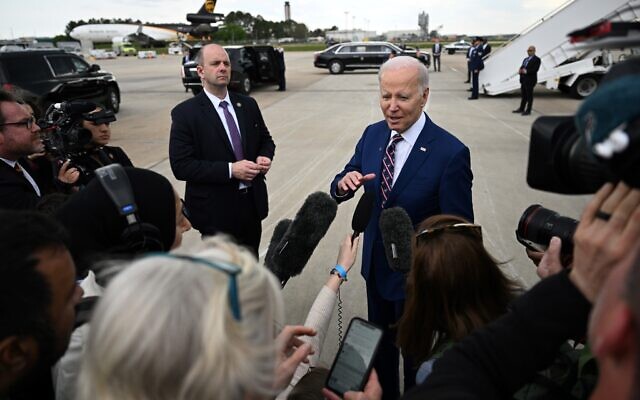Coalition, opposition representatives hold first talks on judicial overhaul
PM Benjamin Netanyahu on Monday agreed to pause the legislation after his firing of Defence Minister Yoav Gallant sparked impromptu protests and strikes across the country

Representatives from coalition and opposition parties gathered at the President’s Residence in Jerusalem on Tuesday evening to begin negotiations over the government’s contentious judicial overhaul plans, in the first face-to-face talks between the sides after three turbulent months of a legislative blitz and nationwide mass protests.
The negotiations came after Prime Minister Benjamin Netanyahu on Monday agreed to pause the controversial legislation, to give a chance for dialogue on the legislation that Justice Minister Yariv Levin publicly unveiled in January, triggering the wave of demonstrations and intense public opposition.
The statement came after his firing of Defence Minister Yoav Gallant for publicly calling for a pause on Sunday night sparked impromptu protests and strikes across the country. Ben Gurion Airport was crippled, shops, banks and even hospitals closed down. Amidst the chaos, calls began to grow from within the coalition for a pause to the relentless legislative blitz, while President Isaac Herzog called on the government to “stop the legislative process immediately”.
“Deep concern surrounds the entire nation. Security, the economy, society – all are threatened,” he tweeted on Monday. “The eyes of all the people of Israel are on you. The eyes of the entire Jewish people are on you. The eyes of the whole world are on you.”
Around 3000 demonstrators marched against the judicial overhaul plan in Tel Aviv on Tuesday, despite the pause.
גם היום ממשיכות ההפגנות. עכשיו מתקיימת בתל אביב “צעדת ההשתקה” של הרופאים והאקדמיה מקריית הממשלה לבית הכרזת העצמאות ברוטשילד. pic.twitter.com/zBYAXdVsNJ
— Nitsan Shafir ניצן שפיר (@nitsanshafir) March 28, 2023
A Tuesday statement from the President’s Office released after the 90-minute meeting said the discussions were conducted in “a positive atmosphere” and that further meetings would be held on Wednesday.
Tuesday’s talks did not touch on the substance of potential reform, but rather focused on the mechanism for negotiations. Channel 12 reported that it was also aimed at fostering a friendly atmosphere more conducive to talks than the fiery, combative rhetoric the sides have employed against each other for weeks.
In a statement after the meeting, the opposition’s Yesh Atid party said that as Israel prepares to celebrate its 75th birthday, there is an opportunity “to make real change, not cosmetic fixes”. The party also reiterated its desire to establish a constitution “based on the values of the Declaration of Independence”.
The opposition National Unity faction said it had demanded the basic principles of keeping the justice system apolitical and setting clear rules for future legislation. It said it had come to talks “with an open heart” and urged the coalition to do the same.
The meeting included a delegation representing Likud and teams for the Yesh Atid and National Unity parties. Other opposition parties, Yisrael Beytenu and Labor, skipped Tuesday’s meeting as they continued to express doubts that Likud was seeking to negotiate in good faith, but indicated they could send their own teams soon.
Some of those in favour of Likud’s proposed overhaul and against any compromise gathered to protest outside the President’s Residence, while others who believe the plan must be thrown out entirely also continued to rally amid the talks.
As discussions were underway in Jerusalem, a collection of 34 protest groups penned a joint letter to opposition heads Yair Lapid and Benny Gantz, imploring the pair to withdraw from the talks that they said were a “deception”.

Organisers encouraged opponents of the overhaul to continue attending weekly protests in Tel Aviv.
The groups also panned Lapid and Gantz for not opposing the Prime Minister’s agreement with National Security Minister Itamar Ben Gvir to advance plans for the formation of a “national guard” force under the far-right minister’s direct control, which they have warned could serve as the far-right minister’s private militia.
Ben Gvir announced on Monday that he had agreed to back Netanyahu’s pause on the judicial overhaul legislation in exchange for a promise to create his long-sought “national guard”. He had earlier reportedly threatened to quit the government, endangering the coalition, if Netanyahu moved ahead with his plan to halt the overhaul.
Yisrael Beytenu said it would join the discussions on condition that Netanyahu walks back the submission of the judicial selection bill to the Knesset secretary, a largely technical move that nevertheless sparked outrage on Tuesday. Filing the bill with the Knesset secretary enables the coalition to call the final votes on its approval with 24 hours’ notice, a move Yisrael Beytenu described as “unacceptable”.
Labor said it was joining the discussion to “ensure that the overhaul laws are not returned to a vote in the Knesset via a back door”.
Meanwhile, United States President Joe Biden on Tuesday issued a grave public warning against the judicial overhaul, saying that Israel “cannot continue down this road”.

“Like many strong supporters of Israel, I’m very concerned. And I’m concerned that they get this straight,” Biden told reporters. “They cannot continue down this road. And I’ve sort of made that clear.
“Hopefully the Prime Minister will act in a way that he can try to work out some genuine compromise, but that remains to be seen,” Biden said, emphasising the word “genuine”.
“We’re not interfering,” the US President added. “They know my position. They know America’s position. They know the American Jewish position.”
Biden also gave an emphatic “no” when asked whether he would be inviting Netanyahu to the White House, adding, “Not in the near term.”
Asked by Reuters’ White House correspondent what he wanted Netanyahu to do regarding the judicial reform law, the President replied, “I hope he walks away from it.”
TIMES OF ISRAEL

comments